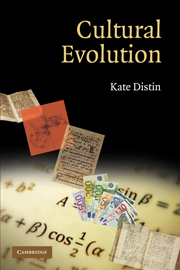Book contents
- Frontmatter
- Contents
- Cultural Evolution
- 1 Introduction
- PART I THE INHERITANCE OF CULTURAL INFORMATION
- PART II THE INHERITANCE OF CULTURAL INFORMATION
- PART III THE INHERITANCE OF CULTURAL INFORMATION
- PART IV THE RECEIVERS OF CULTURAL INFORMATION
- 11 How Does Human Diversity Affect Cultural Evolution?
- PART V THE EXPRESSION OF CULTURAL INFORMATION
- 14 Conclusion
- Appendix
- Acknowledgements
- Bibliography
- Index
11 - How Does Human Diversity Affect Cultural Evolution?
Published online by Cambridge University Press: 05 June 2012
- Frontmatter
- Contents
- Cultural Evolution
- 1 Introduction
- PART I THE INHERITANCE OF CULTURAL INFORMATION
- PART II THE INHERITANCE OF CULTURAL INFORMATION
- PART III THE INHERITANCE OF CULTURAL INFORMATION
- PART IV THE RECEIVERS OF CULTURAL INFORMATION
- 11 How Does Human Diversity Affect Cultural Evolution?
- PART V THE EXPRESSION OF CULTURAL INFORMATION
- 14 Conclusion
- Appendix
- Acknowledgements
- Bibliography
- Index
Summary
Cultural evolution is founded on the persistent inheritance of cultural information via the mechanisms of natural and artefactual languages. These fabulously intricate and capacious representational systems enable cultural resources to be preserved and their variations inherited. Information is any variation that a receiver discretely represents, and humans are uniquely able to learn discrete, compositional systems of representation from one another, which prepare us to receive more cultural information. We are innately disposed to acquire the local natural language as infants, but our metarepresentational abilities enable us to go on learning new languages throughout our lives.
Because information's inheritance is so dependent on the nature of the receivers involved, the nature of the receivers is bound to affect the patterns of its inheritance and, consequently, the course of its evolution. As has already been noted, humans have a unique and universal capacity for metarepresentation, which has been crucial for cultural evolution. What has not so far been acknowledged is the considerable variation in this universal human capacity. This chapter argues that individual metarepresentational ability has a genetic basis, because it is closely related to general intelligence, but that it can also be culturally enhanced, especially by education. In addition, it argues that although there is a fairly complicated relationship between genetic fitness and intelligence, individuals who fall at the higher end of the metarepresentational spectrum are important engines of cultural evolution.
- Type
- Chapter
- Information
- Cultural Evolution , pp. 169 - 182Publisher: Cambridge University PressPrint publication year: 2010



